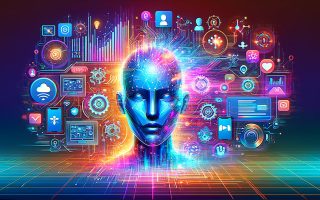For quite some time now, artificial intelligence (AI) has grown in popularity. Not only does it increase human productivity, but it is also reshaping how we conduct business.
In fact, 86% of CEOs report that AI is a mainstay in their workplaces as of 2021. It’s indispensable in previously unheard-of ways, from forecasting client behaviour to minimizing data entry.
Given that AI allows for far faster and more precise decision-making than before, this is hardly surprising. And even though employing it is still a fairly new idea, there are already many business uses for it. We will cover seven current applications of AI in business in this article.
Let’s get this party started!
Current uses of AI in business
Among the most popular uses of AI include automation, data analytics, and natural language processing (NLP). How do these three domains improve operational efficiency and streamline processes? They have the following effects on a variety of businesses:
- Automation: As a result of automation, people are no longer necessary to do monotonous tasks. It frees up employees’ time so they may concentrate on higher-value work by doing boring or mistake-prone chores.
- Data analytics: By identifying novel patterns and connections in data, data analytics enables organizations to uncover insights that were previously unreachable.
- Natural Language Processing (NLP): NLP improves accessibility for people with disabilities, such as hearing impairments, and gives search engines the ability to be smarter, chatbots more helpful.
Current applications of AI in business also include:
- Cross-referencing, data transfer, and file updates
predicting customer behaviour and suggesting products - detection of fraud
- Individualized advertising and marketing communications Customer support via phone or chatbot.
- After giving a brief outline, let’s examine some prominent commercial sectors where artificial intelligence is being used.
1. Artificial Intelligence in Marketing

Many businesses and marketing teams are quickly adopting intelligent technology solutions like AI to boost operational effectiveness while enhancing customer experience. Marketers can gain a deeper understanding of their target audience with AI. The information gathered can then be used to boost conversions while also lightening the workload of marketing staff.
Here are a few examples of recent use of AI in marketing:
Better CRO and individualized website experiences –
While artificial intelligence is still a long way from being able to build entirely new websites, it can help to enhance a website’s user experience by intelligently personalizing it.
An intelligent algorithm can help personalize:
- Website experience – Using artificial intelligence, a single user’s location, demographics, device, interactions with the website, and other information are examined. Based on the analysis, the most suitable offers and content are then displayed.
- Push notifications – Push notifications can be behaviourally personalized to each user, ensuring that they receive the most pertinent message at the best time.
- Computers and systems can use computer vision to recognize objects in digital photos, movies, and other visual inputs and act or advise users accordingly. In order to understand how and where products or services are utilized, marketers can use this to analyze the millions of images posted to social media sites every day. Market penetration and brand recognition can thus be quantified in novel ways.
- Seo Optimization – The word “search volume” in search engine optimization tells us how many people are using particular terms and phrases when seeking for products or services. Machine Learning (ML) techniques are now being utilized to better understand both the content of searches and the intent behind the use of search terms. Another use is to examine rival SEO strategies in order to find any weaknesses in your own or to benefit from terms that rivals aren’t using. AI is also capable of producing SEO-optimized marketing content for your own website.
2. Artificial Intelligence in Sales
The ratio of humans to machines in sales is currently being reevaluated by seasoned salespeople and sales organizations. Sales are already being impacted by automation AI and will continue to be.
A Harvard Business Review study found that businesses utilizing AI for sales can improve leads by more than 50%, cut call times by 60–70%, and reduce costs by 40–60%.
These figures make it abundantly clear that business owners looking to increase their bottom line should investigate artificial intelligence.
Current applications of AI in sales include the following:
Demand forecasting: Though complicated, forecasts can be automated. Based on all client interactions and previous sales successes, artificial intelligence enables the automated and precise development of sales estimates.
Lead scoring: AI helps prioritize leads. Based on their likelihood to convert, these tools assist sales people in prioritizing customers.
By gathering past data about a client, social media postings, and the salesperson’s customer interaction history, the AI algorithm may evaluate the opportunities or leads in the pipeline based on their likelihood of closing successfully.
Sales rep chat/email bot: Chatbots are said to improve sales by 67% on average. They can help start the conversation by sending a tailored message, making it simple for customers to interact right away or come back later.
AI algorithms can also produce personalized emails, saving sales reps from manually sending out personalized messages to several different customers.
3. Artificial Intelligence in Accounting
As previously said, AI may automate laborious tasks, increase accuracy and efficiency, and reveal hidden trends. It has the ability to upload, read, and categorise files using the appropriate accounting codes. AI is error-free and never sleeps or gets tired. It therefore comes as no surprise that AI is advancing in this challenging subject.
The following are a few recent applications of AI in accounting:
Performing repetitive tasks: It takes a lot of an accountant’s time to perform repetitive operations, such as recording data, categorizing transactions, reconciling accounts, entering and connecting data from scanned receipts and invoices to transactions, assessing employee expenditure reports, and monitoring pricing changes.
AI is far more accurate than a human at doing all of these activities. Employees can then concentrate on other current duties without suffering from mental exhaustion.
Semi-automating complex processes: Payroll’s future is expected to be affected by AI’s ability to semi-automate complicated procedures like payroll. True AI systems can analyze data, learn from mistakes, and find strategic solutions to problems, in contrast to automation, which is based on cause-and-effect.
In 2018, the market for cloud-based payroll software was estimated to be worth $7.88 billion, and by 2026, it is expected to grow to $13.37 billion. Executives at companies are becoming more ready to make investments in cutting-edge payroll systems enabled by AI.
4. Artificial Intelligence in Customer Service
Businesses put a lot of effort into making sure that customers value their interactions with them and want to recommend them to others.
One of the best methods to keep consumers satisfied is to promptly address problems. But when more and more demands come in, this could be difficult for businesses that are growing. In order to improve the customer service experience, firms are integrating AI into customer support teams.
Here are a few examples of how AI is now used in customer support:
- Chatbots as front-line customer service representatives – AI-powered bots assist businesses in managing tasks, resolving issues, and even interacting with potential customers. Without a human employee, a large number of customers can be helped by chatbots powered by AI. As a result, chatbots that are driven by AI are being utilized to communicate with clients. In order to determine customer demands and ensure that they are connected to the appropriate personnel, chatbots can be used as the initial point of contact. Additionally, it can reduce wait times and the amount of time customer support representatives spend responding to the same queries.
- Artificial intelligence voicebots – may listen to the caller, gauge their mood, and determine the seriousness of the matter, which helps to reduce the frequency of calls. Similar to a chatbot, an AI voicebot can be taught to respond to frequent queries on its own, just like a chatbot but in speech. They may also be used to enhance call classification and ensure that callers are linked to the most appropriate department because they are able to interpret requests.
5. Artificial Intelligence in Contact Centers
Every customer interaction at a contact centre either strengthens customer loyalty or drives them away. Therefore, effective customer service is a top priority. AI can help businesses better understand their customers because to the abundance of data held in contact centres. The use of virtual agents powered by AI that are, in theory, indistinguishable from people has generated a lot of attention. But for now, these are the practical and well-liked applications of AI in contact centres:
Identifying the most urgent customer inquiries can be done by using artificial intelligence to sort through a large volume of client and lead communications. You may programme AI models to recognize the key terms that denote urgency. AI is able to recognize phrases or words that are crisis-prone in the context of client queries, such as “I’ll abandon your business.” For leads, AI can identify phrases like “This offer sounds interesting” or “I’d like to buy next week” and others that can point to a potential sale. This brings us to the following point below, which is about sales.
Conducting outreach campaigns – An AI voicebot may reach out to hundreds or thousands of people to present the offer, react to basic inquiries, and transfer them to a sales agent if they are interested. Prior to now, most companies were unable to achieve this due to the high cost of hiring actual outreach agents.
6. Artificial Intelligence in Operations
The application of AI to business operations, or AIOps, aids numerous enterprises on their journey to a successful digital transformation. Additionally, operations became sophisticated as a result of the demand for organizational agility, making it difficult for people to keep up. AIOps assists with this by automating specific procedures and allocating staff time to projects with a higher priority.
Here are a few examples of how AI is now used in business:
- Improved IT processes –A machine learning-based AI application can help organizations save a lot of money by improving their IT procedures. Cybersecurity and software maintenance chores can be automated with AI. Additionally, it can identify potential dangers more quickly than people, possibly protecting businesses from online attacks. AI tools assist IT employees in keeping the organization’s systems up to date and everything operating efficiently.
- Digital Transformation: Businesses all over the world are actively implementing cutting-edge technology. Whether it’s in banking, travel, healthcare, or e-commerce, business operations are being automated by first digitizing them and then enabling people to use apps based on new technologies. Information management can be aided by the employment of robotics and blockchain technology, and AIOps lessens friction in IT operations.
As we’ve covered in this post, artificial intelligence (AI) and machine learning have revolutionized businesses and will do so for many years to come. AI use in commercial environments reduces time spent on repetitive processes, increases staff productivity, and improves the entire customer experience across IT operations and sales. Additionally, it assists in error prevention and crisis detection at a level that is beyond human capacity.
Technology makes sense that businesses are using it to enhance all aspects of their operations, from logistics to hiring and employment. We’re convinced that businesses at the forefront of AI will benefit financially and outperform their rivals in the not-so-distant future.





